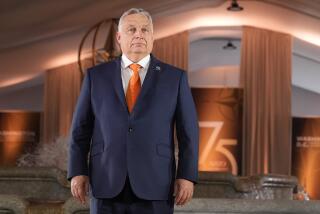Calls Summit a ‘Momentous’ Event in East-West Relations : A Triumphant Reagan Returns to Big Welcome
- Share via
WASHINGTON — President Reagan, triumphantly ending his journey to the Kremlin, told a red-white-and-blue welcome home ceremony Friday that his Moscow summit signaled a “momentous” event in East-West relations.
Speaking to about 4,000 invited guests in a spruced-up hangar at Andrews Air Force Base, the President said his four days of meetings with Soviet leader Mikhail S. Gorbachev were marked by “tangible progress” on arms control and a frank review of other superpower issues.
The President and Mrs. Reagan were officially greeted by Vice President George Bush and his wife, Barbara, at the air base just outside Washington.
“Welcome home and well done,” Bush said, after Reagan worked his way down a receiving line that included several Cabinet members.
“You’ve made a historic contribution to peace in the world,” the vice president said as the crowd waved signs, including one that proclaimed, “Bush for President.”
Reagan, who mentioned that he was tired twice during his remarks, recalled how he had quoted Russian proverbs to Gorbachev and said that during the flight from London, where he paused Thursday en route from Moscow, “It was an American saying that kept running through my mind.”
“As far as Nancy and I are concerned, there’s no place like home.”
Reagan received a lavish ceremonial welcome as he reviewed a trip marked by formal talks with Gorbachev, meetings with dissidents, artists and students, and strolls through Red Square--indelible images of what aides called a capstone of his presidency.
While the summit produced little in the way of concrete achievements, both sides hailed the meetings in Moscow as proof of a more solid relationship, capable of frank discussions of differences as well as searches for agreement in arms control and other areas.
Reagan’s salute to the allies was punctuated by a special tribute to Thatcher, an ideological kindred spirit of conservatism, whom he praised for “valor and candor” that has helped sustain the strength and political will of the West.
Afterward, Thatcher responded in kind, praising Reagan for standing firm in his dealings with the Kremlin and for “taking the fight for human rights to the very heart of the Soviet Union.”
“The summit has brought us closer to the more stable and peaceful relations between East and West that we all want to see,” she said. “Indeed, I believe there is more hope between East and West than ever before in the lifetime of most of us here.”
But a senior Reagan adviser on national security, Colin Powell, seemed somewhat more cautious in speaking with reporters during the long flight home from England.
Powell said the U.S.-Soviet relationship is now “solidly in place” but said there are major differences blocking the way to a comprehensive arms control treaty. “We have to take this slowly,” he said. “In the next six months, the next six years, if you don’t come home with a treaty that the experts, the Congress, don’t see as strong . . . it’ll never be ratified.”
The President made no prediction of a treaty agreement in his remarks in Washington, and did not mention the possibility of a future summit with Gorbachev before his term ends next January.
Reagan’s assessment of the summit was infused with personal observations of Gorbachev and the Soviet people as he spoke with enthusiasm of the talk about “progress toward democratic reform.”
“My personal impression of Mr. Gorbachev is that he is a serious man seeking serious reform,” he said, echoing Thatcher’s early--and much-criticized--assessment of Gorbachev, then new in power, as a man the West “can do business with.”
Reagan welcomed Gorbachev’s commitment to more openness under glasnost and the restructuring of the Soviet economy that is being attempted, with no small amount of internal resistance and debate, under perestroika .
As with other recent positive developments in the atmosphere in which the superpowers coexist and compete, Reagan said: “We look forward to this trend to continue. We must do all we can to assist it.”
Curiously, on the subject of human rights, which was high on his public agenda and caused sparks to fly in Moscow, Reagan was almost silent. He muted his criticism of the Kremlin and said only that “there are signs of greater individual freedom.”
During an earlier photo session with Japanese Prime Minister Noboru Takeshita, who stopped in London while en route from New York to Tokyo, Reagan admitted that he may have used “a bad choice of words” in Moscow when he blamed emigration problems in the Soviet Union on bureaucratic snags rather than repressive government policies.
But he again avoided directly indicting Gorbachev. “I think it is a defect in the entire system,” he said. “It is the system. You can’t place the blame on any individual.”
The trip was not only historic in a political sense, but on a more personal level as well, a fact that Reagan, having stepped foot for the first time into the heart of what he once assailed as “an evil empire,” seemed to recognize.
“Imagine,” he said, “the President of the United States and the general secretary of the Soviet Union walking together in Red Square, talking about a growing political relationship and meeting, together, average citizens, realizing how much our people have in common. It was a special moment in a week of special moments.”
More to Read
Sign up for Essential California
The most important California stories and recommendations in your inbox every morning.
You may occasionally receive promotional content from the Los Angeles Times.










